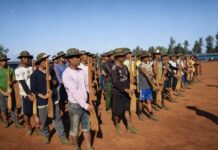 On December 2, a 14-person delegation from Burma flew halfway across the world to Colombia to see what the Latin American nation can teach the peacemakers in our own war-torn country.
On December 2, a 14-person delegation from Burma flew halfway across the world to Colombia to see what the Latin American nation can teach the peacemakers in our own war-torn country.
This is especially true when a deadline has been set for the signing of a Colombian peace deal on March 23, 2016, after which the country’s biggest rebel organization, the Revolutionary Armed Forces of Colombia (FARC) will be abandoning its weapons within six months. In early November, The Economist described it as “a peace process that could become an example to the world.
The delegation from Burma consisted of five representatives from the Burma Army, two from the Myanmar Peace Center (MPC) and the rest from the Karen armed movements that have signed Burma’s Nationwide Ceasefire Agreement (NCA).

There are many things about Colombia which are similar to Burma. It has:
- 68 ethnic languages and dialects
- A population of 48 million
- Endured more than 51 years of war
- Deep involvement in the war by an international superpower (in this case the United States)
- A deep-rooted illicit drug problem
- Undergone peace negotiations that began in 2012
There are also many other things which are different:
- The belligerents will not have a comprehensive peace and ceasefire deal until March 2016. FARC has declared a unilateral ceasefire, but the government led by Juan Manuel Santos has only maintained a “de-escalation” policy which nevertheless has brought down conflict-related violence, according to a think-tank in Bogota (the Colombian capital)
- Formal negotiations, unlike in Burma, are conducted in a third country (Cuba)
- FARC, due to countless reports alleging that it has committed murder, rape, kidnapping, bombings and forced recruitment of children, is very unpopular. Millions took part in demonstrations against it in 2008.
- The agenda for negotiations has only six dialogue items, (compared to six main topics and 32 sub-topic items in Burma) out of which four are already completed.
These main topics are:
- Rural development and land issues (Already agreed)
- Safeguards for participation in politics (Already agreed)
- Cooperation against illicit drugs and for crop substitution programmes (Already agreed)
- Rights of victims, also known as Transitional Justice (Already agreed)
- Ending the conflict, including a bilateral ceasefire and disarmament, demobilization and reintegration (DDR) (Yet to reach agreement)
- Implementation (Yet to reach agreement)
Among Colombia’s dialogue topics, one appears to be conspicuously absent from Burma’s: Transitional Justice.
According to The Economist, those who confess to their crimes and collaborate with a truth commission in Colombia will benefit from light sentences: five to eight years of community work with “effective restrictions on liberty” but no jail time. Those who do not confess will face up to 20 years in jail if convicted. These measures will apply to both FARC and the government officers.
One thing seems to be certain. The Burmese delegation will definitely learn from the Colombian experience and vice versa.
By SAI KHUENSAI / Director, Pyidaungsu Institute and Founder, Shan Herald Agency for News (SHAN)
All views expressed are the author’s own.











Leave a Comments